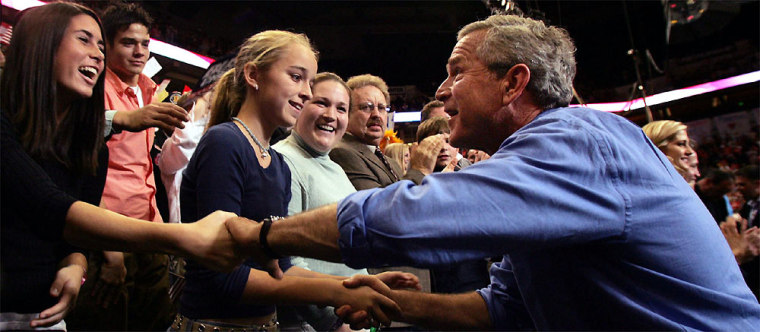With 48 hours of campaigning left, President Bush is holding on to narrow leads over Democratic challenger John Kerry in two-thirds of states surveyed by Mason-Dixon Polling & Research, including six of the nine that remain on most lists of crucial "battleground states" that are considered too close to call.
The 15 state polls were done for MSNBC, Knight Ridder and other media outlets.
In two crucial states, Bush has a four-point lead in Florida, within the poll’s margin of error, and a two-point lead in Ohio, again within the poll’s margin of error.
In Florida, 800 likely voters were interviewed and the survey had a margin of error of 3.5 points. In Ohio, 625 likely voters were interviewed and the margin of error was four points.
In Iowa, which Democratic candidate Al Gore carried by 4,144 votes last time, pollsters found that the president has a five point lead, 49 percent to 44 percent over Kerry. Some 636 likely Iowa voters were interviewed and the poll had a margin of error of four percentage points.
Bush trails by two points in Pennsylvania and likewise by two in Michigan and in Wisconsin, where he and Kerry both campaigned Saturday. Gore carried all three of those states in 2000.
Nowhere, except in states the Kerry campaign has pretty much conceded, such as Arkansas and West Virginia, did the polling find the president with comfortable leads. In each of those states, Bush has a lead of eight percentage points.
The most encouraging news for Kerry in the surveys, which were conducted from Oct. 26 to Oct. 29, was that Bush’s leads in Florida, Ohio and Minnesota, where the president had a one-point lead, were so tiny as to be statistically negligible.
What’s disheartening for Kerry in the surveys’ findings is that so far Kerry has not been able to take a significant lead in any of the states Bush carried in 2000. The Massachusetts senator finds himself in the final two days of campaigning spending some of his time defending Democratic turf, Wisconsin and Michigan, even as he presses the attack in Ohio and Florida.
Bush final campaign tour
Bush will make campaign stops Sunday and Monday in Ohio, Florida, Iowa, Wisconsin and New Mexico.
In New Mexico, pollsters found that Bush has 49 percent to Kerry’s 45 percent in the state.
If all of the polls’ findings were to be exactly replicated on Election Day, Kerry would lose three states that Al Gore carried four years ago, Iowa, Minnesota, and New Mexico, which together have 22 electoral votes, which, if Bush won them, would more than offset the loss of Ohio’s 20 electoral votes.
Of the 15 states surveyed by Mason-Dixon, Kerry has a lead, and a tiny one, in only one of those that Bush carried in 2000, New Hampshire, where 47 percent of respondents backed Kerry and 46 percent back Bush.
One of the sources of resilience for Bush seems to be that he enjoys greater loyalty from self-identified Republicans than Kerry does from self-identified Democrats. In Florida, for instance, Mason-Dixon found that 88 percent of Republicans support Bush, while 79 percent of Democrats back Kerry.
In what is an excruciatingly tight election, such small differences can have a decisive impact.
The polls were conducted before Friday’s airing of a new videotape by Osama bin Laden in which he seems to make an offer for a cease-fire in the war between his followers and the United States. Bin Laden also attacks Bush as part of a “dictatorship” and accuses him and his brother, Florida Gov. Jeb Bush, of “rigging” the 2000 presidential election in Florida.
Terrorism continues to be one of the reasons Bush clings to a narrow lead in most battleground states. In the Minnesota survey, for instance, when asked who they feel would do a better job at handling issues related to homeland security and terrorism, 53 percent said Bush, while only 39 percent opted for Kerry.
Campaigning in Wisconsin Saturday, Kerry responded to bin Laden’s statement with a reaffirmation of his position that Bush “was wrong to divert our forces from Afghanistan so that we could rush to war in Iraq without a plan to win the peace.”
Apparently seeking to dispel any idea that sentiment is shifting toward Bush, Kerry adviser and pollster Stan Greenberg told reporters Saturday, “We’re looking at remarkably stable race — a remarkably dead-heat race — that’s true this week, that’s true this Saturday, nothing that we’ve looked at up until now has changed the character of this race.”
Greenberg add, “The undecided (vote) is still there, has not closed on this last weekend. They are very much change voters, who I believe will not express their preference until they go to the polls.”
Another Kerry aide, Tad Devine, pointed out that in 2000 “ going into that last weekend, Gore trailed in almost all public polls, sometimes by a large margin, and that was reversed on Election Day.”
Devine also took heart in the fact that the Kerry campaign is outspending the Bush campaign “significantly in terms of paid media in the state of Florida.”
Mason-Dixon conducted polls for MSNBC and Knight Ridder in Arkansas, Iowa, Michigan, Missouri, New Hampshire, Ohio, Oregon, Pennsylvania, West Virginia and Wisconsin. The Minnesota survey was conducted for the St. Paul Pioneer-Press. The New Mexico poll was done for the Santa Fe New Mexican and KOB Television. And a poll in Nevada was done for the Las Vegas Review-Journal.
